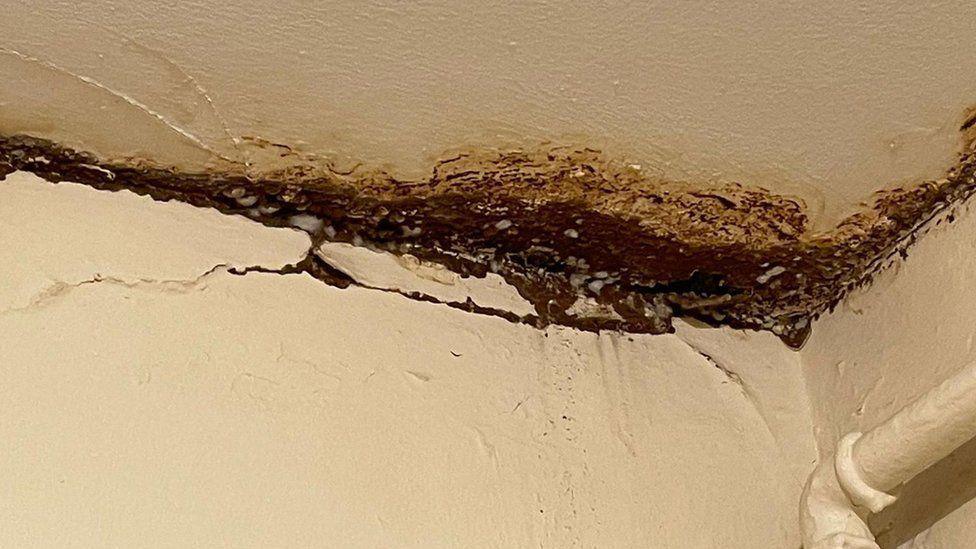Damp and mouldy housing could see personnel leave military

MPs warn that soldiers may leave the military if housing standards don't improve
- Published
Damp and mouldy accommodation could see more personnel deciding to leave the military unless improvements are made, MPs are warning.
Two-thirds of homes for service families need "extensive refurbishment or rebuilding" to meet modern standards, the Commons defence committee has concluded.
The cross-party group says it is "not confident" the money will be made available to tackle the issue.
A Ministry of Defence (MoD) spokesperson told the BBC the report "lays bare the dire state of service accommodation this government inherited and is determined to fix."
Two years ago, the BBC reported on military families living in damp and mouldy conditions. At the time, the MoD said it was working with its contractors to improve the service.
But the report released on Wednesday said those problems "still exist".
"It is shocking that until a policy change in 2022, it was considered acceptable to house families in properties known to have damp and mould", it said.
In July 2023, the Defence Infrastructure Organisation (DIO) - which is responsible for maintaining and servicing military accommodation - was given £400m to tackle those issues over the next two years.
But, the report said, "outstanding problems" remain across the estate that the DIO "must resolve".
One person told the committee in written evidence that they had their damp "surveyed (multiple times)".
They were given a "standard package" to fix the problem which, they said, was "largely reported as being unfit for purpose".
"This one size fits all methodology wastes money and does not get to the root of the problem", they said.
The DIO told the committee it had seen "positive results" in packages of works delivered to address damp and mould in "over 80% of cases".
The committee said detailed statistics on the number of properties affected should be published by June next year, and be updated annually.

One family in service accommodation shared this photo with the BBC in December 2022, of mould in their utility room
The report also highlights problems with single-living accommodation.
There are "issues such as a lack of hot water for months in winter, heating failure, flooding, damp, rat infestations and inadequate facilities for washing and cooking", the report said.
"Ageing accommodation blocks often cannot meet modern living requirements and standards", it added, and "this is having an adverse effect on recruitment and retention".
The report said 40% of those living in single-living accommodation said their experience living there had "increased their intention to leave the armed forces" - up from 34% in 2022.
In written evidence to the committee, one person said there were "broken ceiling panels, outdated bathrooms and washing facilities, furniture and fittings that are over 40 years old".
It "does not represent a modern fighting force", they said.
But the committee said it was "not confident" there would be enough money available to fix the issues it highlights.
"The MoD has acknowledged that current levels of funding are insufficient to bring all service accommodation up to decent, modern standards, and that 'it is investment that ultimately will lead to the change'."
However "in the current economic climate, and with so many competing pressures on public funds, we are not confident that the sustained investment required will be forthcoming in future Defence budgets."
Military families complain of damp, mouldy housing
- Published14 December 2022
MoD pauses new Army housing plans after backlash
- Published27 February 2024
MoD refurbishes 140 homes for military families
- Published18 May 2024
The report mainly reflects the situation from May - under the previous Conservative government - with little to no evidence taken under the current Labour government.
In response, a Ministry of Defence spokesperson said: "We are delivering our Plan for Change by renewing the nation's contract with those who serve, and we are working hard to improve the quality of housing for our personnel and their families – including developing new standards for service accommodation," they said.
"We are committed to listening to our people and are establishing an Armed Forces Commissioner to act as a strong, independent champion for personnel and their families to improve service life."
Labour chair of the Defence Committee, Tan Dhesi, said "it is simply not acceptable to expect those who fight for their country to live in housing with serious damp and mould – conditions that pose a danger to their and their families' health."
"It is clear that many of these problems cannot be solved without major investment", he said.
"However difficult public finances might be, the Ministry of Defence and Treasury need to find a way to work together to make sure that all Service housing on offer genuinely meets a decent standard."